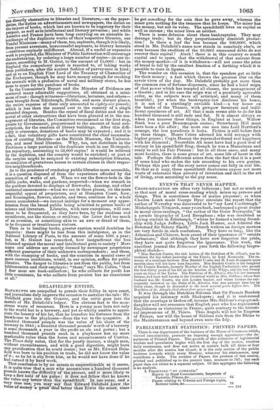EVENTS THAT NEVER HAPPEN.
CROSS-READINGS are often very ludicrous ; but not so much so as that sort of moral cross-reading which mixes up persons and things. This is sometimes done of malice prepense ; as when Charles Lamb made George Dyer circulate the report that the author of Waverley was discovered to be " my Lord Castlereagh." Michelangelo Titmarsh, some years back, burlesqued a great dealer in moral cross-readings, "the author of the Great Necropolis," in a pseudo biography of Lord Brougham ; who was described as having studied in Edinburgh, "where he formed a lasting friend- ship with Judge Jeffreys, Little Jack Homer, and Admiral the Reverend Sir Sidney Smith." French writers on foreign matters are very fertile in such confusions. They have so long, like the Athenians and Chinese, been proud of their ignorance of " outside barbarians," that although they have now forgotten the pride, they have not quite forgotten the ignorance. This week, the excellent journal the Evenement puts forth the following biogra- phical sketch- " Miss Burdett Coutts, the rich heiress of the Dutchess of St. Alban's, was in- troduced the day before yesterday at the Elysea, by Lord Normanby. The ru- mours of a marriage between Miss Burdett Coutts and lot. Louis Bonaparte some months since will not have been forgotten. Miss Burdett Coutts is the daughter of Sir Francis Burdett, formerly Member of the English Parliament; who passed the first thirty years of his life on the benches of the Whigs, and the last twenty years on those of the Tories. The Dutchess of St. Alban's, who left her immense fortune, bad been well known in the theatrical world as Mrs. Siddons; whose first husband was Mr. Coutts, the rich London banker, and whose fortune she sub- sequently bestowed on the Duke of St.,Alban's; who was younger than her by thirty years, though he descended to the tomb several years before her. The Dutchess of St. Alban's died about four years ago."
It was through the Dutchess Siddons that Sir Francis Burdett acquired his intimacy with Shakspere ; and it is understood that the marriage is broken off, because Mrs. Siddons's step-grand- daughter will not renounce that English poet who has represented Englishmen as victorious in France, quite contrary to the histori- cal impressions of M. Thiers. Thus Angela will not be Empress of France, nor will the house of Siddons rule from the Rhine to the Mediterranean and beyond even unto the Isly.


























 Previous page
Previous page